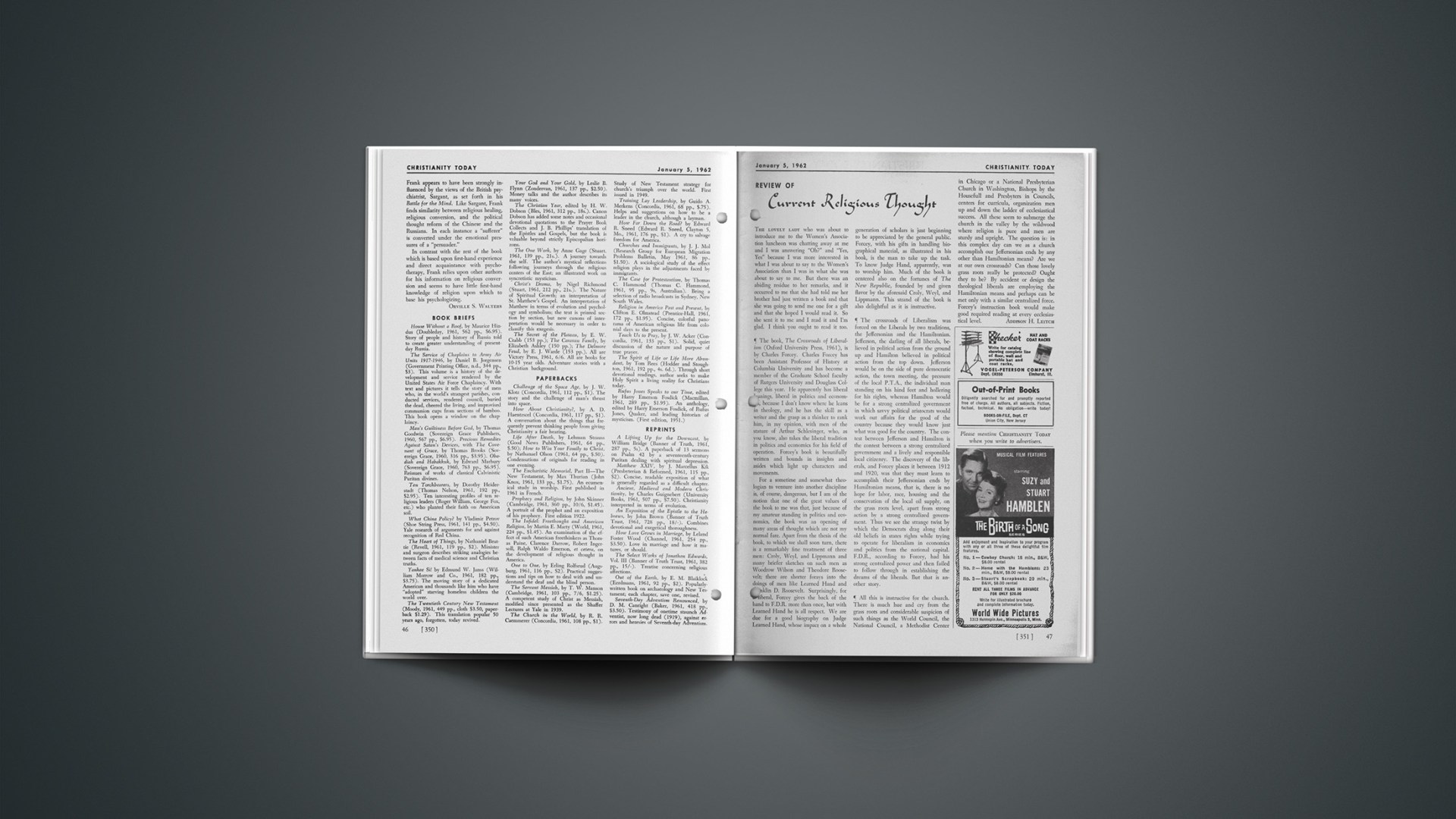The lovely lady who was about to introduce me to the Women’s Association luncheon was chatting away at me and I was answering “Oh?” and “Yes, Yes” because I was more interested in what I was about to say to the Women’s Association than I was in what she was about to say to me. But there was an abiding residue to her remarks, and it occurred to me that she had told me her brother had just written a book and that she was going to send me one for a gift and that she hoped I would read it. So she sent it to me and I read it and I’m glad. I think you ought to read it too.
The book, The Crossroads of Liberalism (Oxford University Press, 1961), is by Charles Forcey. Charles Forcey has been Assistant Professor of History at Columbia University and has become a member of the Graduate School faculty of Rutgers University and Douglass College this year. He apparently has liberal leanings, liberal in politics and economics, because I don’t know where he leans in theology, and he has the skill as a writer and the grasp as a thinker to rank him, in my opinion, with men of the stature of Arthur Schlesinger, who, as you know, also takes the liberal tradition in politics and economics for his field of operation. Forcey’s book is beautifully written and bounds in insights and asides which light up characters and movements.
For a sometime and somewhat theologian to venture into another discipline is, of course, dangerous, but I am of the notion that one of the great values of the book to me was that, just because of my amateur standing in politics and economics, the book was an opening of many areas of thought which are not my normal fare. Apart from the thesis of the book, to which we shall soon turn, there is a remarkably fine treatment of three men: Croly, Weyl, and Lippmann and many briefer sketches on such men as Woodrow Wilson and Theodore Roosevelt; there are shorter forays into the doings of men like Learned Hand and franklin D. Roosevelt. Surprisingly, for liberal, Forcey gives the back of the hand to F.D.R. more than once, but with Learned Hand he is all respect. We are due for a good biography on Judge Learned Hand, whose impact on a whole generation of scholars is just beginning to be appreciated by the general public. Forcey, with his gifts in handling biographical material, as illustrated in his book, is the man to take up the task. To know Judge Hand, apparently, was to worship him. Much of the book is centered also on the fortunes of The New Republic, founded by and given flavor by the aforesaid Croly, Weyl, and Lippmann. This strand of the book is also delightful as it is instructive.
The crossroads of Liberalism was forced on the Liberals by two traditions, the Jeffersonian and the Hamiltonian. Jefferson, the darling of all liberals, believed in political action from the ground up and Hamilton believed in political action from the top down. Jefferson would be on the side of pure democratic action, the town meeting, the pressure of the local P.T.A., the individual man standing on his hind feet and hollering for his rights, whereas Hamilton would be for a strong centralized government in which savvy political aristocrats would work out affairs for the good of the country because they would know just what was good for the country. The contest between Jefferson and Hamilton is the contest between a strong centralized government and a lively and responsible local citizenry. The discovery of the liberals, and Forcey places it between 1912 and 1920, was that they must learn to accomplish their Jeffersonian ends by Hamiltonian means, that is, there is no hope for labor, race, housing and the conservation of the local oil supply, on the grass roots level, apart from strong action by a strong centralized government. Thus we see the strange twist by which the Democrats drag along their old beliefs in states rights while trying to operate for liberalism in economics and politics from the national capital. F.D.R., according to Forcey, had his strong centralized power and then failed to follow through in establishing the dreams of the liberals. But that is another story.
All this is instructive for the church. There is much hue and cry from the grass roots and considerable suspicion of such things as the World Council, the National Council, a Methodist Center in Chicago or a National Presbyterian Church in Washington, Bishops by the Housefull and Presbyters in Councils, centers for curricula, organization men up and down the ladder of ecclesiastical success. All these seem to submerge the church in the valley by the wildwood where religion is pure and men are sturdy and upright. The question is: in this complex day can we as a church accomplish our Jeffersonian ends by any other than Hamiltonian means? Are we at our own crossroads? Can those lovely grass roots really be protected? Ought they to be? By accident or design the theological liberals are employing the Hamiltonian means and perhaps can be met only with a similar centralized force. Forcey’s instruction book would make good required reading at every ecclesiastical level.










